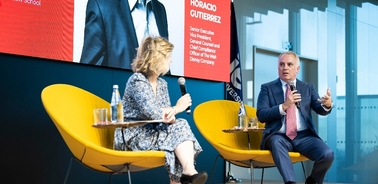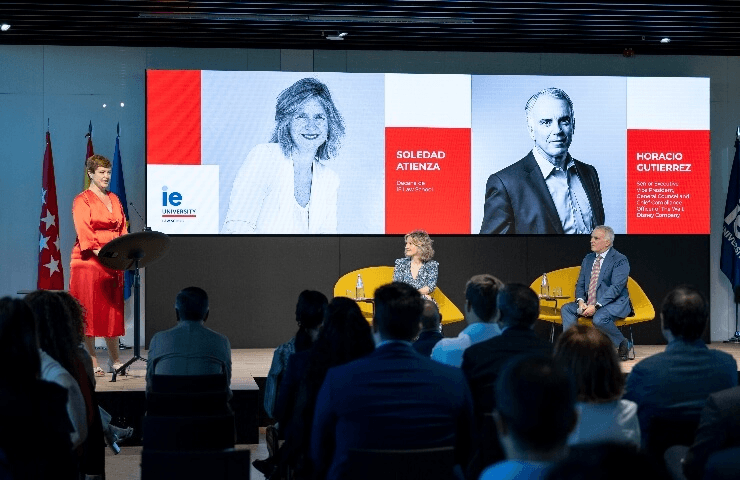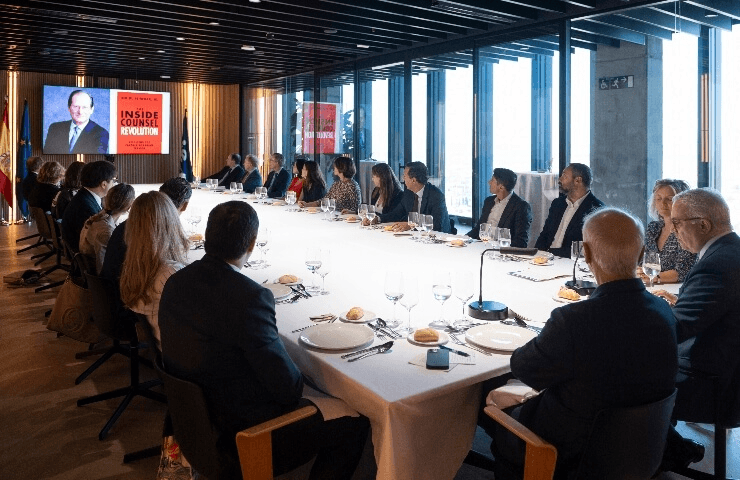- Home
- We Are Law School
- News
- The Role Of Lawyers In Business And Society
The role of lawyers in business and society

Horacio Gutiérrez, senior executive vice president, general counsel and chief compliance officer of The Walt Disney Company, talks to us about the challenges of corporate law.
IE Law School was recently visited by Horacio Gutiérrez, senior executive vice president, general counsel and chief compliance officer of The Walt Disney Company. Gutiérrez has more than 30 years’ experience in the entertainment and technology industry, in companies such as Spotify and Microsoft.
 María Serrano, director of the Advanced Legal programs at IE Law School, welcomed students and teachers.
María Serrano, director of the Advanced Legal programs at IE Law School, welcomed students and teachers.On October 2, Gutiérrez was the guest speaker at the academic opening ceremony of IE Law School’s Advanced Legal programs. During the event, he had an interesting talk with Soledad Atienza, dean of the institution, about the challenges of the in-house corporate lawyer, and their role in companies and society. Here’s how their discussion went:
Soledad Atienza: How has the role of the in-house corporate lawyer evolved? How has it become increasingly involved in business strategy?
Horacio Gutiérrez: From the 1970s until the early 2000s there was a renaissance of the in-house lawyer. With economic globalization and technological development, their role shifted from interpretation to anticipation of the law. Today, at the same time that companies are facing external pressures, they are also facing internal pressures from their employees.
How has the role of the corporate counsel evolved in society?
Nowadays, companies must not only have a license to operate under local law, but also a social license—they must be accepted by society. All of this has regulatory implications.
Why is it the responsibility of legal departments to be the guardians of companies' reputations?
There are few departments that have a horizontal view across all functions, which gives us a much more complete picture.
Our job is to predict the consequences of the actions we take. Corporate consulting to ensure ethical behavior has always been part of the focus of the legal department. We are the company’s conscience when making decisions that have a range of consequences—some known, others unknown.
What’s your view on artificial intelligence (AI) from the regulatory point of view, and how will it change the production of legal services?
We’re at the stage of understanding what it is and what it does. I see positive and very interesting potential in AI; for example, to be used as a tool for creativity in the entertainment industry. However, there’s no regulatory framework that governs it and sets down limits. There are great risks of hastily using AI models to create ethical responsibilities for in-house lawyers and law firms. We, at Disney, are trying to delineate the kinds of functions it can be used for, and those for which it cannot, and how to set boundaries so there are no irreversible situations in the long term.
Regarding the legal function, AI will have its effects; they are tools that support the exercise of the legal function, making us more productive and effective. But legal judgment cannot yet be automated. Those of us who practice law know that legal judgment is an art rather than a science. That’s why, on the basis of its value, I’m a little skeptical that AI will replace us in the long term.
Regarding the growing relevance of ESG for companies and also for law firms, what’s the situation in the US?
A common element for companies is the societal expectation that we have clear positions on how we define our ESG situation. In the US, there’s a recent movement against ESG initiatives, so there’s pressure from customers and employees to implement those criteria, and external political pressure not to. At Disney, for example, we’re in litigation against the state of Florida because we’ve taken a public position against legislation that prevents teachers from talking about sexual orientation and gender, a law referred to as “Don't say gay.”
 Horacio Gutiérrez, during the talk given to executives of the major Spanish law firms.
Horacio Gutiérrez, during the talk given to executives of the major Spanish law firms.We live in a confusing and convulsive time, making both internal and external advice from the lawyer to the company more complex.
After the event, Gutiérrez participated in a talk organized by the LawAhead Center on the Legal Profession, addressed to executives of legal firms CMS Albiñana & Suárez de Lezo, Cuatrecasas, Garrigues, Gómez Acebo y Pombo, Perez-Llorca, RocaJunyent, Sagardoy Abogados and Uría Menéndez, on the role of the in-house lawyer in the 21st century. The LawAhead Center on the Legal Profession is a pioneering project that aims to promote reflection on the challenges and opportunities of the legal sector in Spain and around the world.
"Legal judgment cannot yet be automated."
Horacio Gutiérrez, Senior Executive Vice President, General Counsel and Chief Compliance Officer of The Walt Disney Company